Fleurs du Mal Magazine


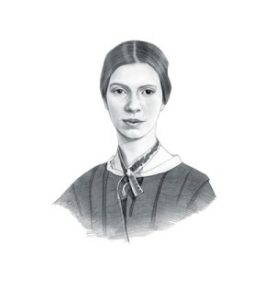
Rouge et Noir
Soul, wilt thou toss again?
By just such a hazard
Hundreds have lost, indeed,
But tens have won an all.
Angels’ breathless ballot
Lingers to record thee;
Imps in eager caucus
Raffle for my soul.
Emily Dickinson
(1830—1886)
Rouge et Noir
• fleursdumal.nl magazine
More in: Archive C-D, Archive C-D, Dickinson, Emily
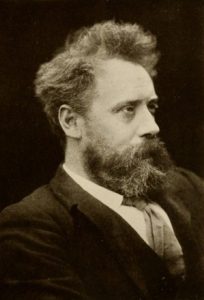
Invictus
Out of the night that covers me,
Black as the pit from pole to pole,
I thank whatever gods may be
For my unconquerable soul.
In the fell clutch of circumstance
I have not winced nor cried aloud.
Under the bludgeonings of chance
My head is bloody, but unbowed.
Beyond this place of wrath and tears
Looms but the Horror of the shade,
And yet the menace of the years
Finds and shall find me unafraid.
It matters not how strait the gate,
How charged with punishments the scroll,
I am the master of my fate,
I am the captain of my soul.
William Ernest Henley
(1849—1903)
Invictus
• fleursdumal.nl magazine
More in: Archive G-H, Archive G-H, Henley, William Ernest
This is the first publication in English of the anthology that contains Breton’s definitive statement on l’humour noir, one of the seminal concepts of Surrealism, and his provocative assessments of the writers he most admired.
While some of the authors featured in The Anthology of Black Humor are already well known to American readers–Swift, Kafka, Rimbaud, Poe, Lewis Carroll, and Baudelaire among them (and even then, Breton’s selections are often surprising)–many others are sure to come as a revelation.
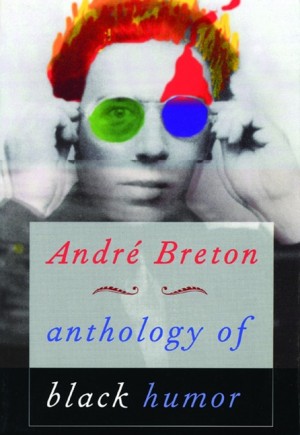 The entries range from the acerbic aphorisms of Swift, Lichtenberg, and Duchamp to the theatrical slapstick of Christian Dietrich Grabbe, from the wry missives of Rimbaud and Jacques Vache to the manic paranoia of Dali, from the ferocious iconoclasm of Alfred Jarry and Arthur Craven to the offhand hilarity of Apollinaire at his most spontaneous.
The entries range from the acerbic aphorisms of Swift, Lichtenberg, and Duchamp to the theatrical slapstick of Christian Dietrich Grabbe, from the wry missives of Rimbaud and Jacques Vache to the manic paranoia of Dali, from the ferocious iconoclasm of Alfred Jarry and Arthur Craven to the offhand hilarity of Apollinaire at his most spontaneous.
For each of the forty-five authors included, Breton has provided an enlightening biographical and critical preface, situating both the writer and the work in the context of black humor–a partly macabre, partly ironic, and often absurd turn of spirit that Breton defined as “a superior revolt of the mind.”
“Anthologies can aim to be groundbreaking or thought-provoking; few can be said to have introduced a new phrase–or a new concept–into the language. No one had ever used the term “black humour” before this one came along, unless, perhaps, it was from a racial angle.”–The Guardian
Andre Breton (1896-1966), the founder and principal theorist of the Surrealist movement, is one of the major literary figures of the past century. His best-known works in English translation include Nadja, Mad Love, The Manifestoes of Surrealism, The Magnetic Fields (with Philippe Soupault), and Earthlight. Mark Polizzotti is the author of Revolution of the Mind: The Life of Andre Breton.
Mark Polizzotti is an author, translator, and publisher living in New York. His books include Revolution of the Mind: The Life of André Breton, Highway 61 Revisited, Sympathy for the Traitor: A Translation Manifesto, and Why Surrealism Matters.
His essays and reviews have appeared in The New York Times, The New Republic, The Wall Street Journal, Apollo, ARTnews, The Nation, Parnassus, Bookforum, and elsewhere. His translations of works by Gustave Flaubert, Arthur Rimbaud, Scholastique Mukasonga, Patrick Modiano, Marguerite Duras, André Breton, Eric Vuillard, among others, have won the English PEN Award and been shortlisted for the National Book Award, the International Booker Prize, the NBCC/Gregg Barrios Prize, and the French-American Foundation Translation Prize.
He is a Chevalier of the Ordre des Arts et des Lettres and the recipient of an American Academy of Arts and Letters Award for Literature.
Anthology of Black Humor
by André Breton
Translator: Mark Polizzotti
Publisher: City Lights Publishers
Language: English
356 pages
ISBN-10: 0872863212
ISBN-13: 978-0872863217
Paperback 1997
Price: $26.95
E-book 2021 (978-0872868496)
Price: $18,99
•fleursdumal.nl magazine
More in: - Book Lovers, André Breton, Archive A-B, Archive A-B, Dada, DADA, Surrealism

Verlorenes Lied
Ich bin arm und habe nichts.
Nichts! Garnichts!
Nichts als lange Haare –
Bin zweiundzwanzig Jahre –
Sind rotes Gold, meine Haare,
Sagen die Kaufleut’ mir.
Ich bin arm und habe nichts.
Nichts! Garnichts!
Nichts als gemalte Brauen –
Fluch den ehrbaren Frauen! –
Sind tintenschwarz, meine Brauen,
Sagen die Schreiber mir.
Ich bin arm und habe nichts.
Nichts! Garnichts!
Nichts als kecke Blicke –
Weißt du, wem ich sie schicke ? –
Sind scharfes Schrot, meine Blicke,
Sagen die Jäger mir.
Ich bin arm und habe nichts.
Nichts! Garnichts!
Nichts als reife Lippen –
Tugend fährt über Klippen –
Sind kirschensüß, meine Lippen,
Sagen die Gärtner mir.
Ich bin arm und habe nichts.
Nichts! Garnichts!
Nichts als geschmeidige Sohlen –
Ei, in der Schenke das Johlen! –
Sind zum Tanzen gemacht, meine Sohlen,
Sagen die Spielleut’ mir.
Ich bin arm und habe nichts.
Nichts! Garnichts!
Nichts als weiße Glieder –
Blankes Gold lockert mein Mieder –
Sind Flammen der Lust, meine Glieder,
Sagst heute nacht du mir.
Ich bin arm und habe nichts.
Nichts! Garnichts!
Nichts als ein Leben in Schande,
Einen Tod am Straßenrande –
Einst in zerlumptem Gewande
Scharrt man mich ein im Sande.
Wo ? Sagt keiner mir.
Ich bin arm und habe nichts.
Nichts! Garnichts!
Nichts als die heimliche Zähre –
Daß ich so arm nicht wäre! –
Nur meine Dirnenehre!
Vom Strauch fällt die tausendste Beere;
Fault sie, wer sucht nach ihr ?
Sterb’ ich, wer weint nach mir?
Gertrud Kolmar
(1894 – 1943)
Verlorenes Lied
•fleursdumal.nl magazine
More in: *War Poetry Archive, Archive K-L, Archive K-L, Kolmar, Gertrud
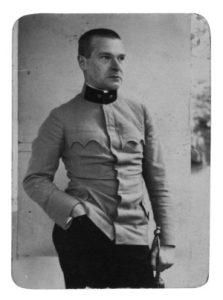
In Venedig
Stille in nächtigem Zimmer.
Silbern flackert der Leuchter
Vor dem singenden Odem
Des Einsamen;
Zaubrisches Rosengewölk.
Schwärzlicher Fliegenschwarm
Verdunkelt den steinernen Raum
Und es starrt von der Qual
Des goldenen Tags das Haupt
Des Heimatlosen.
Reglos nachtet das Meer.
Stern und schwärzliche Fahrt
Entschwand am Kanal.
Kind, dein kränkliches Lächeln
Folgte mir leise im Schlaf.
Georg Trakl
(1887 – 1914)
In Venedig
• fleursdumal.nl magazine
More in: *War Poetry Archive, - Archive Tombeau de la jeunesse, Archive S-T, Archive S-T, Expressionism, Expressionisme, Trakl, Georg, Trakl, Georg
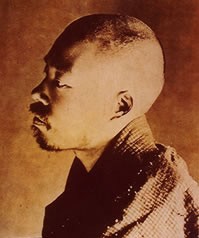
Buddha-death
Buddha-death:
the moonflower’s face,
the snake gourd’s fart
Masaoka Shiki
(1867-1902)
Buddha-death
•fleursdumal.nl magazine
More in: #Editors Choice Archiv, Archive S-T, Archive S-T, Shiki, Masaoka
Feeling All the Kills is a dazzling new collection that breaks the poet’s silence on what it means to experience and live in the wake of a violent assault and rape.
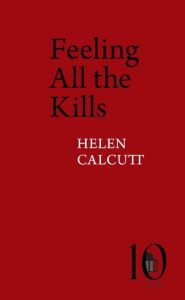 Calcutt weaves stunning musicality with raw, unhindered storytelling, as the poems both collectively, and in their individual power, explore the distinctly connected, yet fractured selves of ‘sexual being’, ‘mother’ and ‘abused person’.
Calcutt weaves stunning musicality with raw, unhindered storytelling, as the poems both collectively, and in their individual power, explore the distinctly connected, yet fractured selves of ‘sexual being’, ‘mother’ and ‘abused person’.
Through the poems’ breathtaking and vital vocabulary Calcutt brings the physical, emotional, and sexual nuances of life to the foreground, with strength, subtlety and beauty, and courageously harnesses a sense of ownership over such a lasting trauma.
At the heart of this collection is a personal desire to navigate a way back to a sensual, whole-feeling self, to shamelessly ‘feel all’ — with authenticity and power.
Helen Calcutt is a leading artist and choreographer working with a specialism in text embodiment within theatre & movement. She is the author of three volumes of poetry and Artistic Director of dance-theatre company ‘Beyond Words‘.
Her writing has been published globally. ‘Somehow’ (Verve Poetry Press, 2020), was a PBS Winter Bulletin Pamphlet & Poetry School Book of the Year (2020). Anthology ‘Eighty-Four’ (Verve Press, 2019), created in aid of the suicide prevention charity C.A.L.M. was a Saboteur Award shortlist & a Poetry Wales Book of the Year, 2019. Her full-length collection ‘Feeling All the Kills’ was published by Pavilion Poetry, April 2024.
Feeling All the Kills
by Helen Calcutt (Author)
Pavilion Poetry
Publisher: Liverpool University Press
28 April 2024
Language : English
Paperback : 84 pages
ISBN-10 : 1802074724
ISBN-13 : 978-1802074727
£10.11
•fleursdumal.nl magazine
More in: #Modern Poetry Archive, - Book News, - Bookstores, Archive C-D, Archive C-D
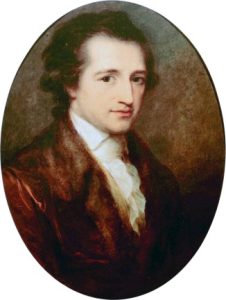
Der Sänger
Was hör ich draußen vor dem Tor,
Was auf der Brücke schallen?
Laß den Gesang vor unserm Ohr
Im Saale widerhallen!
Der König sprachs, der Page lief;
Der Knabe kam, der König rief:
Laßt mir herein den Alten!
Gegrüßet seid mir, edle Herrn,
Gegrüßt ihr, schöne Damen!
Welch reicher Himmel, Stern bei Stern!
Wer kennet ihre Namen?
Im Saal voll Pracht und Herrlichkeit
Schließt, Augen, euch; hier ist nicht Zeit,
Sich staunend zu ergetzen.
Der Sänger drückt’ die Augen ein
Und schlug in vollen Tönen;
Die Ritter schauten mutig drein,
Und in den Schoß die Schönen.
Der König, dem das Lied gefiel,
Ließ, ihn zu ehren für sein Spiel,
Eine goldne Kette holen.
Die goldne Kette gib mir nicht,
Die Kette gib den Rittern,
Vor deren kühnem Angesicht
Der Feinde Lanzen splittern;
Gib sie dem Kanzler, den du hast,
Und laß ihn noch die goldne Last
Zu andern Lasten tragen.
Ich singe, wie der Vogel singt,
Der in den Zweigen wohnet;
Das Lied, das aus der Kehle dringt,
Ist Lohn, der reichlich lohnet.
Doch darf ich bitten, bitt ich eins:
Laß mir den besten Becher Weins
In purem Golde reichen.
Er setzt’ ihn an, er trank ihn aus:
O Trank voll süßer Labe!
O wohl dem hochbeglückten Haus,
Wo das ist kleine Gabe!
Ergehts euch wohl, so denkt an mich,
Und danket Gott so warm, als ich
Für diesen Trunk euch danke.
Johann Wolfgang von Goethe
(1749-1832)
Der Sänger
•fleursdumal.nl magazine
More in: # Music Archive, Archive G-H, Archive G-H, Goethe, Johann Wolfgang von, J.W. von Goethe
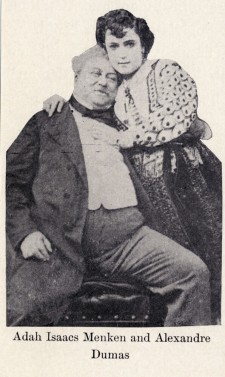
Aspiration
Poor, impious Soul! that fixes its high hopes
In the dim distance, on a throne of clouds,
And from the morning’s mist would make the ropes
To draw it up amid acclaim of crowds—
Beware! That soaring path is lined with shrouds;
And he who braves it, though of sturdy breath,
May meet, half way, the avalanche and death!
O poor young Soul!—whose year-devouring glance
Fixes in ecstasy upon a star,
Whose feverish brilliance looks a part of earth,
Yet quivers where the feet of angels are,
And seems the future crown in realms afar—
Beware! A spark thou art, and dost but see
Thine own reflection in Eternity!
Adah Isaacs Menken
(1835 – 1868)
Aspiration
•fleursdumal.nl magazine
More in: - Archive Tombeau de la jeunesse, Archive M-N, Archive M-N, Menken, Adah, THEATRE
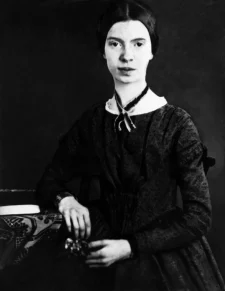
Wild nights
– Wild nights!
Wild nights – Wild nights!
Were I with thee
Wild nights should be
Our luxury!
Futile – the winds –
To a Heart in port –
Done with the Compass –
Done with the Chart!
Rowing in Eden –
Ah – the Sea!
Might I but moor – tonight –
In thee!
Emily Dickinson
(1830—1886)
Wild nights – Wild nights!
• fleursdumal.nl magazine
More in: Archive C-D, Archive C-D, Dickinson, Emily
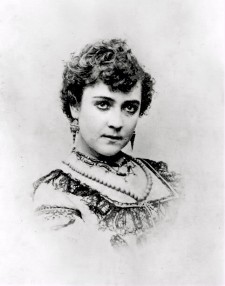
A Memory
I see her yet, that dark-eyed one,
Whose bounding heart God folded up
In His, as shuts when day is done,
Upon the elf the blossom’s cup.
On many an hour like this we met,
And as my lips did fondly greet her,
I blessed her as love’s amulet:
Earth hath no treasure, dearer, sweeter.
The stars that look upon the hill,
And beckon from their homes at night,
Are soft and beautiful, yet still
Not equal to her eyes of light.
They have the liquid glow of earth,
The sweetness of a summer even,
As if some Angel at their birth
Had dipped them in the hues of Heaven.
They may not seem to others sweet,
Nor radiant with the beams above,
When first their soft, sad glances meet
The eyes of those not born for love;
Yet when on me their tender beams
Are turned, beneath love’s wide control,
Each soft, sad orb of beauty seems
To look through mine into my soul.
I see her now that dark-eyed one,
Whose bounding heart God folded up
In His, as shuts when day is done,
Upon the elf the blossom’s cup.
Too late we met, the burning brain,
The aching heart alone can tell,
How filled our souls of death and pain
When came the last, sad word, Farewell!
Adah Isaacs Menken
(1835 – 1868)
A Memory
•fleursdumal.nl magazine
More in: - Archive Tombeau de la jeunesse, Archive M-N, Archive M-N, Menken, Adah, THEATRE
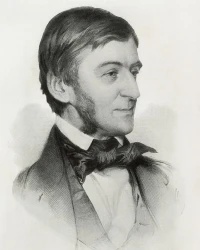
Water
The water understands
Civilization well;
It wets my foot, but prettily,
It chills my life, but wittily,
It is not disconcerted,
It is not broken-hearted:
Well used, it decketh joy,
Adorneth, doubleth joy:
Ill used, it will destroy,
In perfect time and measure
With a face of golden pleasure
Elegantly destroy.
Ralph Waldo Emerson
(1803 – 1882)
Water
•fleursdumal.nl magazine
More in: *Archive African American Literature, Archive E-F, Archive E-F, Emerson, Ralph Waldo
Thank you for reading Fleurs du Mal - magazine for art & literature